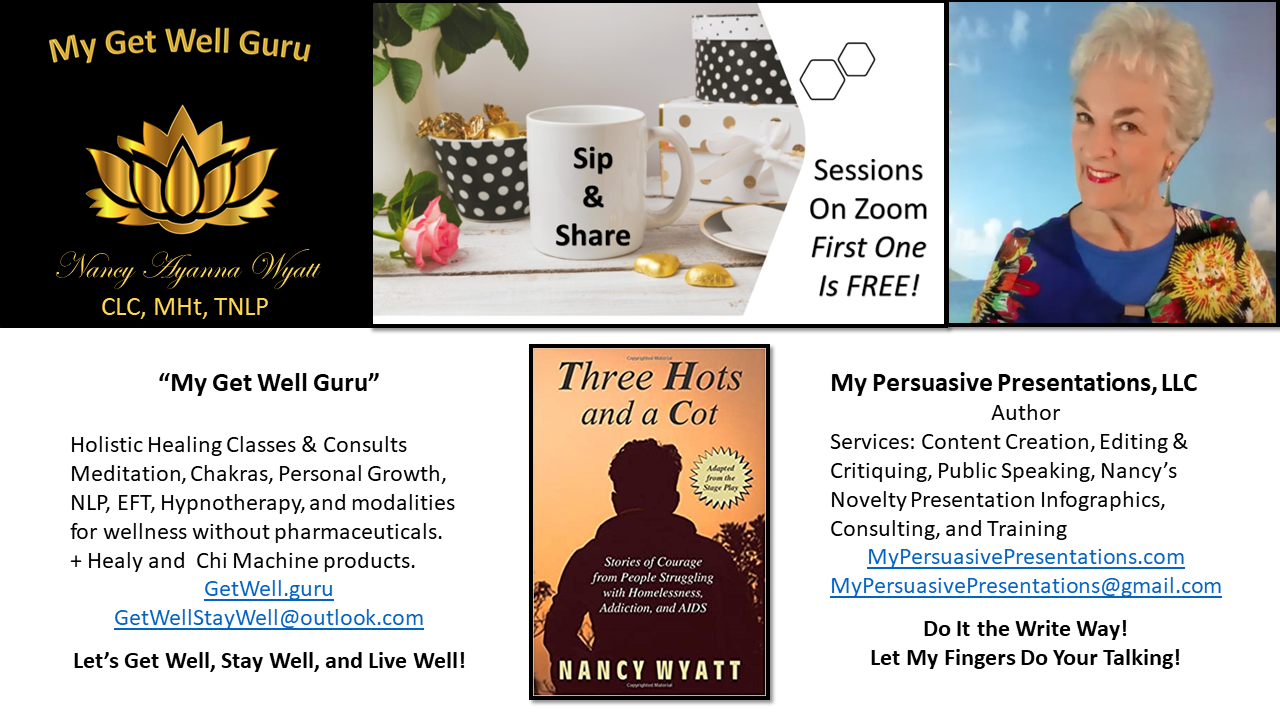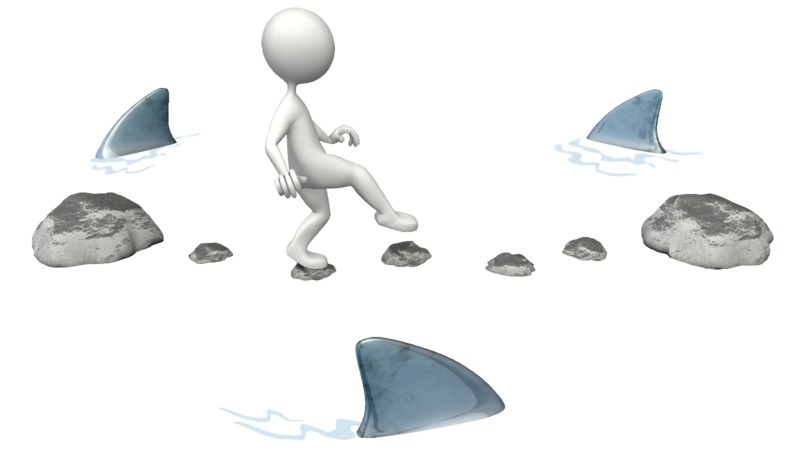 Anxiety?
Anxiety?
I promise not to tell you, “Take three deep, cleansing breaths,” or “Count to ten,“ although that, too, would be helpful as a start!
Instead, I’ll recap some points covered in an inspirational Zoom session I had recently with some of my Life Coach colleagues. We talked about ways in which anxiety is a
helpful messenger
motivator
tool for success
in both business and personal situations.
We shall look at some examples. (If you’re in a hurry or just want to – scroll past the definitions to “get to the meat” of the conversation. Look for the heading, “Pain Is the Point – In a Good Way!”) Scroll to the end to find books as reference materials, if you want to learn more from experts on the subject.
Authenticity Matters
(Or, “What’s good for the goose is good for the gander.” As always in this group, we apply the ideas to ourselves, as well as offering them as techniques to help our clients. It reminds me of the words of an old Scottish proverb, “Open confession is good for the soul.”
We share our authentic thoughts and feelings about whatever topic is at hand, and that sometimes creates and relieves anxieties simultaneously. By the end of a session, it always leaves us rejuvenated and feeling good.
(If you want to try it in a confidential setting, contact me for a Sip & Share Session on Zoom. Details at the end of this blog post.)
The Natural Tendency Is to Avoid Anxiety and Try to Get Rid of It ASAP!
We try to find a safe path to circumvent perceived sources of danger.
Anxiety causes physical and psychological symptoms of stress and feelings of insecurity. Typically, people view it as something to avoid and suppress. In fact, some go to great lengths to avoid experiencing the sense of being out of control of keeping safe and the inability to predict outcomes. We distract ourselves with addictions to shopping, substance abuse, entertainment, etc. However, avoidance is not a healthy way to address anxiety over the long term. Instead, we are wise to face it and embrace it.
Anxiety Is E-Motion!
What I love about that is the concept that EMOTION GENERATES MOTION!
Definitions
Let’s define “emotions.” I’ll give you three versions since I disagree with elements of both definitions offered by the American Psychological Association.
The first definition, as posited by the American Psychological Association, is:
Emotions are conscious mental reactions (such as anger or fear) subjectively experienced as strong feelings usually directed toward a specific object and typically accompanied by physiological and behavioral changes in the body.
My Point of Disagreement: I believe you can have “underlying emotions” that are, by definition, NOT purely conscious mental reactions. They may be stored in subconscious realms, including muscle memory, and might affect you without your conscious awareness of their doing so.
Another definition from the American Psychological Association.
a complex reaction pattern, involving experiential, behavioral, and physiological elements, by which an individual attempts to deal with a personally significant matter or event. The specific quality of the emotion (e.g., fear, shame) is determined by the specific significance of the event. For example, if the significance involves threat, fear is likely to be generated; if the significance involves disapproval from another, shame is likely to be generated. Emotion typically involves feeling but differs from feeling in having an overt or implicit engagement with the world. —emotional adj.
My Point of Disagreement: I believe strong emotions also are evoked over things that are not normally defined as “personally significant,” such as seeing or learning about tortuous things that happen in faraway wars or cruelty to humans, animals, and the earth.
Good Ole’ Aristotle!
I prefer Aristotle’s version. He wrote, “Emotions are all those feelings that so change men as to affect their judgments, and that are also attended by pain or pleasure. Such are anger, pity, fear, and the like, with their opposites.”
Pain Is the Point – In a Good Way!
 The sensation of uncertainty is unpleasant. However, that discomfiture is the point! What? YES!
The sensation of uncertainty is unpleasant. However, that discomfiture is the point! What? YES!
 For Anxiety to do its job, it must be disruptive.
For Anxiety to do its job, it must be disruptive.
What is Anxiety’s job?
To promote action, so that we may find solutions – or, at least, relief through acceptance of changed circumstances.
It is up to us to understand it, make friends with it, and use it well.
Anxiety Can Serve a Great Purpose
When we allow or embrace feelings of anxiety, they can:
- Cause us to evaluate the dangers, costs, and/or benefits of what we are experiencing or anticipate as consequences of action and inaction.
- Inspire us to overcome inertia by calling us to act. We might choose to
- Run away from something.
- Run toward something.
- Change direction altogether.
- Motivate us to get feedback from others to enable us to
- “Think outside the box.”
- Learn how others view us versus how we understand ourselves.
- Help us contemplate ways of solving problems that are not concepts we normally consider.
- Garner resources others may be willing to offer us.
- Make us more resourceful in finding non-standard solutions.
- That might involve anything from research to “jury-rigging.”
- Like transferable skills, we might discover transferable solutions that will work, albeit they were designed for other kinds of challenges.
- Help us change how we interpret circumstances, problems, or people (also known as “reframing”).
- Promote problem-solving skills and ideas, thereby giving us confidence and tools to use when facing issues in the future.
- Stimulate creativity and even joy.
- Drive us to take actions that rescue us from the despair that may accompany inaction.
Anxiety | Action Readiness
All that anxiety-induced stress (physical, mental, emotional), makes us reflexively ready to take action. It may be
- Protective – to find ways to protect oneself, one’s family, one’s job, property, interests, etc.
- Productive – encouraging people to explore new approaches, and solutions and to explore the anxiety, itself.
Anxiety demands our focused attention, informs us through bodily sensations of the status of things, motivates us to act, and gives us the endurance to keep going. We can choose a mindset that allows us to accept the discomfort, listen to it, tap into our creativity, and be encouraged with the hope that we can effect solutions.
3 Resource Books About Anxiety
First, the topic was based, in part, on two books that might be good resources for you.
- “Future Tense, Why Anxiety is Good for You (Even Though It Feels Bad)” by Tracy Dennis-Tiwary, PhD
- Positive Intelligence by Shirzad Chamine
From a layman’s perspective, Alivette Vigo Sidiqi penned her experiences and wisdom as a person who has undergone PTSD from several traumatic incidents in her life. Her book is Make Peace with Anxiety. (Also available in the Spanish language.) I happen to know Alivette and appreciate her honesty and wisdom as it is outlined in this easy read accessible to people at all levels.
Want to Talk About Anxiety?
Try a Free Sip & Share Session with Me!
I know several techniques for short-term stress release, as well as tools for reducing or eliminating fears, negative beliefs, and various forms of anxiety. If you are interested, I’ll set up a free initial session on Zoom where we can chat. See contact details below.
Who knows if I’ll be blond, brunette, or silver-haired when we talk on Zoom?
Email me at GetWellStayWell@Outlook.com and put “Request Sip & Share re Anxiety” in the subject line. We’ll coordinate schedules and then I’ll send you a link for a Zoom chat. All information is held strictly confidential. If you want to book me to lead a class or make a presentation on the topic, put “Request Class (or Presentation) About Anxiety.








